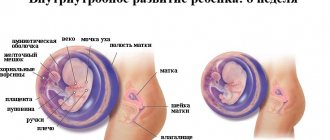Pregnancy is a happy period during which a woman’s body undergoes a serious test of strength. All organs experience increased stress, and the digestive system is no exception. Disturbances in its functioning manifest themselves in the form of discomfort (feelings of heaviness, fullness), pain, and possibly pain in the stomach area. What medications will help cope with the problems that have arisen? A popular enzymatic drug is Festal. How safe is this product for pregnant women? Is it possible to drink Festal during pregnancy?
Features of the state of the digestive organs during pregnancy
Under the influence of hormones, the smooth muscles of the gastrointestinal tract are forced to reduce their tone, relax, and become less active. In this regard, the acidity level of the stomach decreases, food begins to move through the intestines very slowly, and the pregnant woman experiences bloating, flatulence, constipation, nausea, heartburn, and vomiting.
To activate the work of the stomach and intestines, doctors recommend using folk remedies, leading a feasible active lifestyle, monitoring your diet, including as many cereals, vegetables and dairy products as possible, or taking enzyme preparations.
As for this group of medications, Festal is considered the safest for pregnant women. Pregnant women tolerate the drug very well; the drug has a quick and effective effect, breaking down proteins, fats and carbohydrates and facilitating their absorption by the body.
Why is Festal often prescribed to pregnant women?
The drug is safe for the human body; The “area of responsibility” of medicinal substances is the intestinal lumen; they do not enter the bloodstream. So Festal is allowed to be taken by expectant mothers, and at all stages; but since the instructions for the drug instruct pregnant women to take the drug with caution, doctors recommend putting aside packages of Festal in the 1st trimester.
Digestive problems in pregnant women
It is more difficult for those who are pregnant to give up delicious fast food, soda and sweets with a large number of harmful chemical additives. The need to eat deliciously follows a woman’s heels; Many people reassure themselves with the well-known thesis “a pregnant woman’s wishes are the law” and fill their stomachs to capacity. Junk food quickly disables the digestive system, making the expectant mother bitterly regret what she ate frivolously.
Pregnant women, like children, belong to the group of people who find it especially difficult to resist delicious fast food
Incompatible foods also cause indigestion; If you ate a lot of meat and potatoes or washed down buns with milk, expect flatulence and constipation.
In addition to food, the following factors negatively affect digestion:
- increased production of the hormone progesterone, which is responsible for reducing the muscle tone of the uterus and preventing the threat of miscarriage; however, valuable progesterone simultaneously relaxes the intestinal muscles, disrupting the motility of the organ and inhibiting digestion;
- decreased stomach acidity (due to relaxation of smooth muscles); In such an environment, enzymes work sluggishly, food moves towards exiting the body extremely slowly.
As a result, a woman - even one who did not abuse fast food - is surprised to discover:
- bloating;
- heartburn;
- nausea (and sometimes even vomiting);
- constipation
Heartburn is one of the unpleasant companions of pregnancy; when the expectant mother overeats, the symptoms of malaise intensify
What do the doctor's say
Competent doctors do not rush to fill out forms with prescriptions for medications or write down the names of over-the-counter medications for the patient on a piece of paper. To begin with, the doctor will recommend that the expectant mother suffering from constipation and flatulence use folk remedies, introduce more vegetables, fruits, and cereals into her diet, lie on the couch less and move more.
It is also possible to prescribe an enzyme preparation - doctors recommend Festal more often than others, since it is considered the safest. However, experts warn: although the medicine is sold in pharmacies without a prescription, using Festal on your own seems frivolous. The effect of pancreatin on the fetus has not been studied in detail; There is not yet enough scientific data to declare the product harmless.
If the expectant mother decides to get rid of intestinal problems with the help of Festal, she should first go not to the pharmacy, but to the doctor’s office
In addition, after conception, a time of change begins in the female body: hormonal changes push internal organs to work in a new way; the main task from now on is to provide the fetus with resources for growth and development. In such conditions, even harmless drugs that a woman took without fear before now pose a potential threat to the health of both mother and baby. True, pancreatin was not found to have a teratogenic effect on the fetus (causing congenital deformities).
A good doctor will allow the use of the drug Festal only after he has become thoroughly acquainted with the characteristics of the patient’s body, finds out what diseases she has or is suffering from and what ailments she complains of. Probably, the doctor will eventually advise the expectant mother to do without medications altogether and limit herself to changing her diet.
When Festal helps
Digestive problems in women are often a symptom of serious pathologies that cannot be cured by diet or exercise in the morning. Therefore, Festal is used in cases of overeating with serious consequences for the body, and in other situations indicated in the instructions for the drug, including:
- chronic pancreatitis - inflammation of the pancreas; the drug is prescribed when the gland stops producing the required amount of gastric juice with enzymes;
- toxic liver poisoning, liver cirrhosis;
- disruptions in the circulation of bile - for example, with dysbacteriosis or dysfunction of the biliary tract;
- lack of bile acids after surgery to remove the gallbladder;
- impaired bile production in chronic gastritis, duodenitis, cholecystitis;
- difficulty chewing food;
- Digestive problems due to forced bed rest and a sedentary lifestyle.
A recumbent lifestyle during pregnancy provokes difficulties with digestion, which ends in flatulence and constipation.
How does the drug affect the fetus in different trimesters?
In the early stages, the formation of the main organs and tissues is in full swing; the intervention of medicinal substances threatens to disrupt the sensory mechanism and provoke developmental defects in the baby. Moreover, the “guardian” of the fetus - the temporary organ the placenta - has not yet formed, so the unborn child is defenseless against external aggressive factors.
The components of Festal are no exception - they penetrate to the baby. Here are the main dangers from using the product:
- enzymes in the composition of the drug negatively affect the development of crumbs;
- Too intense intestinal peristalsis, which occurs under the influence of Festal, also leads to intense contractions of the uterus, which increases the risk of miscarriage.
The conclusion is simple: if possible, stop taking Festal in the 1st trimester, even though such a precaution is not prescribed in the instructions.
In the 2nd trimester, the fetus is already protected by the placenta; although it does not block the path of every substance in the composition of the drugs, the danger of toxic poisoning for the baby is reduced. And the formation of organs is nearing completion. Pregnant women take Festal carefully according to the regimen suggested by the doctor.
After 36 weeks of gestation, it is better to stop using medications; Childbirth is approaching, and any drug intervention threatens complications of the natural process.
Doctors' opinion
Characterizing Festal as one of the optimal means for normalizing and supporting the functioning of the gastrointestinal tract, medical representatives, however, do not advise pregnant women to take the medicine on their own.
Pregnancy is a period when a woman is deprived of the right to make decisions related to the choice of medications. Even though the instructions say that the product is completely safe, doctors are confident that there are no completely safe pills for pregnant women. The body has changed so much that it may not accept any medicine that was previously familiar as harmless.
Therefore, with all problems, no matter how insignificant they may seem to a pregnant woman, it is necessary to contact your doctor. He will make a decision on the need to use Festal only after a detailed analysis of the state of the pregnant woman’s body and taking into account all her complaints.
If it is possible to normalize the functioning of the gastrointestinal tract by adjusting the pregnant woman’s diet, the decision will be made in favor of changing the diet. The doctor may prescribe Festal if other treatment methods are ineffective.
Analogs
In terms of medicinal action, Festal has more than 40 analogues. During pregnancy, the following medications may also be prescribed:
The main component of these medications is pancreatin, although there are some differences in composition. The unconditional analogue of Festal is Enzistal. Mezim does not contain hemicellulase, which makes it possible to use it for gallstone disease. Creon contains more enzymes. Panzinorm also does not contain hemicellulase, in addition, it does not contain bile.
Only a specialist should select an analogue.
Composition and effect of the drug
The active substance of Festal is pancreatin.
Excipients - hemicellulase and bile components, necessary for the digestion of coarse food fibers and the absorption of fat-soluble vitamins.
The peculiarity of the constituent components of Festal is that they contribute to the activation of the body’s own enzyme system and act on two levels:
- provides the body with missing enzymes;
- causes the pancreas to work actively and produce its own enzymes.
The components of the drug are not absorbed into the blood and act exclusively in the intestinal lumen.
Festal is safe for the human body, but during pregnancy it must be taken with great caution - the risk of harm to the fetus still exists. Therefore, it is recommended to use Festal during pregnancy only under the guidance of a physician.
Pregnancy and digestion
During the period of bearing a baby, a woman’s body undergoes serious changes that affect hormonal levels, the functioning of the endocrine system, and the circulatory system. A pregnant woman experiences frequent mood swings and emotional outbursts.
- a feeling of heaviness in the stomach after each meal, which is accompanied by a desire to lie down or sleep. The feeling of heaviness may not go away for six to eight hours. This condition indicates that the woman lacks some enzymes, which prevents food from being digested correctly and on time;
- bloating and increased gas production after eating throughout the day for no apparent reason (if you have not consumed foods that can cause such conditions). Such symptoms may indicate that the woman has impaired stomach acidity, fermentation, or has gastrointestinal irritation. Although in the latter case it should be noted that the same symptoms can arise as a result of natural processes, since the growth of the uterus leads to the fact that it begins to compress the intestines, and as a result, its normal peristalsis is disrupted. In addition, an increase in progesterone in the blood of a pregnant woman, a hormone that is designed to reduce the motor activity of the uterus, leads to a simultaneous decrease in intestinal activity;
- constant churning in the stomach. This sign indicates slow absorption of food and accompanies such serious diseases as gastritis, cholecystitis, ulcers, parasites, dysbacteriosis, intestinal inflammation, pancreatitis;
- smell from the mouth. Sometimes it is a sign of improper processing of food;
- frequent urge to go to the toilet after eating;
- pain in the stomach, burning in the upper abdomen, heartburn, belching;
- lack of appetite in the morning for five to six hours after sleep. People whose gastrointestinal tract functions normally usually experience a feeling of hunger in the morning. Its absence indicates that yesterday’s food was not digested overnight, which is not the norm;
- irregular bowel movements and constipation.
How to take Festal during pregnancy
The drug is released in tablet form, which must be taken during meals with a sufficient amount of warm still water.
If a pregnant woman for some reason does not take the pill with food, this should be done immediately after eating while the digestive process continues.
The number of tablets per dose is 1-2 pieces, the number of doses per day is no more than three. The need to take the drug more frequently is discussed by the pregnant woman with her doctor on an individual basis.
Isolated cases of dietary errors (overeating) require a single dose of the drug.
To correct the effects of hormones or dietary disturbances, Festal is taken for several days.
But if we are talking about chronic diseases, the use of the drug can be very long, or even lifelong.
Dosage and method of administration
The tablets should be taken with or immediately after meals with warm water. It should be enough for the drug to enter the duodenum. Pregnant women can take one tablet per meal. It should not be chewed, crushed or divided.
The dosage of the drug depends on the symptoms, mainly 3 tablets per day. For acute and severe pain, as well as in cases of advanced disease, the dosage is increased at a time to 2 tablets.
Treatment takes several days, and sometimes it can take several months, it all depends on the severity of the disease. But this treatment is not suitable for pregnant women. Your doctor may prescribe an individual dosage.
If you have problems with nutrition, it is enough to take a pill once, but sometimes you need to take them for several days. For chronic pathologies of the gastrointestinal tract, Festal is taken for a long time.
Indications for use
The main problem of pregnant women is overeating. At a certain stage of pregnancy, the appetite increases so much that the woman is ready not to leave the table. And in this case, you need to be able to limit yourself, despite the stereotype that a pregnant woman should eat for two.
It is not possible to limit, so the first reason for prescribing Festal to pregnant women is a failure of the functioning of the stomach due to excessive amounts of food consumed.
Other important indications:
- bloating, impaired digestion of food in chronic pancreatitis and insufficient enzymatic function of the pancreas;
- dysbacteriosis;
- chronic diseases of the digestive system;
- disruption of the processes of formation and separation of bile;
- violation of chewing function;
- sedentary lifestyle.
Rules for taking Festal during pregnancy
The drug is sold in the form of white dragees, packaged in blisters of 10 pieces each. The dragees dissolve once they reach the intestines. Take the pills orally with warm water (still). The tablets must be swallowed during meals; If you suddenly forget about the medicine at the right time, you still have the opportunity to take it immediately after a meal while digestion continues.
Festal's dragees are packaged in blisters; Each package indicates the composition of the drug and the amount of substances
You cannot chew the pills, otherwise the product will be useless. The pills are coated, which protects the drugs from premature dissolution in the mouth and stomach. The destination of the drug is the intestines; there the shell finally dissolves, releasing enzymes ready for action. If you chew the capsule, the enzymes will end up in the stomach and will not reach the intestines “in working condition.”
Too cold or too hot food reduces the effect of Festal; both the woman’s own enzymes and the enzymes from the drug function at body temperature. When foods enter the intestines cold, the substances will not begin to process until the food is warmed. And at temperatures above 50 °C, the enzymes from Festal disintegrate.
Dosage and course of therapy
The dose indicated in the instructions for pregnant women must be adjusted by the doctor. Adult “portions” of the drug - 1-2 tablets 3 times a day; Perhaps the doctor will consider this excessive and reduce the dosage. To get rid of the symptoms of overeating, sometimes 1-2 tablets are enough - limit yourself to that.
Do not take Festal during pregnancy on an ongoing basis, even when you suffer from chronic pathologies. Yes, the medicine is sometimes prescribed for a long course, but this is not your case. In general, long-term use of drugs with pancreatin provokes a further decrease in pancreatic secretion (why should it strain when ready-made enzymes regularly enter the intestines?) and, as a result, systemic problems with digestion. So agree with your doctor on the course of treatment.
When digestive difficulties appear regularly, it is in vain to rely on Festal; Additional medical examination, competent therapy corresponding to the established diagnosis, and a gentle diet that is not prohibited for pregnant women will help.
An overdose of Festal leads to an increase in the level of uric acid in the body, which threatens gout (a type of arthritis). In such a situation, the medicine should be abandoned until the symptoms of the pathology disappear.
Who should not take Festal
The enzyme preparation is absolutely not suitable for pregnant women who have:
- intolerance to drugs in Festal;
- pancreatitis in acute form (but for chronic pancreatitis, Festal, on the contrary, is prescribed - but only until the disease worsens);
- hepatitis, liver failure and other complications associated with liver function;
- intestinal obstruction;
- formation of stones in the gall bladder;
- obstructive jaundice - appears when the outflow of bile into the duodenum is disrupted; the level of the bile pigment bilirubin increases in the blood, causing the skin and sclera to acquire a yellow tint;
If there are problems with the outflow of bile, the sclera turns yellow; taking Festal in such a situation is contraindicated - tendency to diarrhea.
Festal reduces the body's ability to absorb iron, which will worsen the condition of a pregnant woman who suffers from anemia. Unfortunately, anemia is a common companion for pregnant women, but if the lady also has digestive problems, Festal is unlikely to be suitable for treatment.
The instructions recommend taking the medicine with great precautions for cystic fibrosis, a hereditary pathology that disrupts the functioning of the external secretion glands (sweat, salivary, genital, and so on).
Adverse reactions to the drug
A negative response from the body occurs, as a rule, when taking the medicine in a regular or increased dosage, which is completely undesirable for pregnant women. Symptoms of allergy to the components of the drug are also possible; Allergens are dangerous for the development of the baby, so even a banal rash on the skin is a reason to refuse Festal for the entire period of pregnancy.
Some of the side effects include:
- skin redness;
- hives;
Red spots from the action of allergens can appear on the face and other parts of the body; complications from allergies are especially dangerous for pregnant women - tearfulness;
- sneeze;
- Quincke's edema is a dangerous condition, sometimes leading to difficulty breathing and swelling of the larynx; death from suffocation is possible;
- nausea, vomiting;
- intestinal colic;
- diarrhea;
- irritation of the oral mucosa.
How Festal interacts with other medications
If you take Festal tablets together with antibiotics - in particular, sulfonamide drugs - the enzyme medicine will increase the ability of antibacterial agents to be absorbed into the body. But the effectiveness of drugs with iron or folic acid when used simultaneously with Festal, on the contrary, will decrease.
Pancreatin in Festal inhibits the absorption of the substance acarbose, a carbohydrate blocker. So, a note to those who are being treated for diabetes: medications with acarbose and Festal are not “friendly” and should not be taken at the same time.
Calcium carbonate and magnesium hydroxide also conflict with pancreatin; Taking medications with the first two substances in the composition will reduce the effect of the third.
But the drug Cimetidine, which is used to treat stomach ulcers (by the way, it is not contraindicated for pregnant women), will increase the effect of Festal.
Contraindications
- Acute pancreatitis;
- hypersensitivity to the components of the drug;
- hepatitis;
- diarrhea or tendency to it;
- gastric obstruction.
Pregnant women should take Festal with caution due to the risk of allergic reactions. A skin rash can only be considered banal in a non-pregnant state, and even then - not always. A pregnant body does not tolerate allergic reactions so easily, in addition, they cannot but affect the condition of the fetus.
Modern medicine knows a lot of cases of congenital allergies, and a considerable part of them occurred due to the thoughtless use of medications by mothers during pregnancy.
Side effects
While taking the drug, a pregnant woman should be especially attentive to her health and respond to all symptoms that appear. If you suddenly notice even a slight bowel disorder (constipation or diarrhea), you should stop taking Festal.
It can be drunk only in cases where there are no side effects. And these include:
- nausea;
- vomit;
- pain in the lower abdomen;
- tearfulness;
- sneezing;
- inflammation of the mucous membranes of the eyes, nose and mouth;
- skin rash.
In the absence of side effects, Festal can be taken during pregnancy. But not for a long time and not without the approval of a doctor. Since this is still a drug that affects not only the functioning of the woman’s digestive system, but also the fetus.
Author : Skryagina Ekaterina, especially for the site Zhkt.ru
Festal by trimester
1st trimester
The appointment is possible, but undesirable, since the contractile activity of the stomach can harm the embryo and provoke a miscarriage. If there are digestive problems, a pregnant woman is advised to change her diet and use folk remedies. Festal is prescribed if other methods have proven ineffective. The use of the drug should be very careful and accompanied by medical consultation and observation.
2nd trimester
Prescription is possible for bloating, flatulence and other symptoms of digestive disorders. Festal is prescribed by the attending physician based on the patient’s clinical picture, drawing up an individual therapy regimen and dosage of the medication.
"Festal": is it possible or not?
If dietary fractional meals, adherence to a regimen, and folk remedies do not help, the doctor may recommend taking medications containing the enzymes necessary to improve digestion.
"Festal" is produced in enteric-coated tablets.
The main active ingredient of the drug is pancreatin. Festal contains the following enzymes:
- lipase;
- amylase;
- protease;
- hemicellulose.
In addition, the tablets contain bovine bile extract.
The use of the medicine leads to improved breakdown and absorption of foods that contain fats, proteins, carbohydrates and plant substances.
"Festal" can be prescribed for problems with the absorption of food, with the functioning of the pancreas, flatulence, irritable bowel syndrome, diarrhea, heaviness in the stomach.
Folk remedies and methods of prevention
If possible, the expectant mother should stop taking any medications. To normalize the condition of the digestive tract and prevent bloating and other unpleasant symptoms, you should adhere to the following recommendations:
- The best way to prevent gastrointestinal disorders is a proper diet. The expectant mother should eat food every three hours in small portions - this way the digestive system can better cope with its processing.
- It is necessary to drink enough liquid.
- There are foods that cause bloating. Their use should be limited. These include fermented milk products, legumes, cabbage, turnips, and grapes. Avoid eating foods that are too salty or sweet, fatty, spicy, or fried.
- The diet should include lean meats and fish, whole grain bread, seafood, and cereals.
- The last meal should be several hours before bedtime.
- Herbal teas and decoctions based on medicinal plants help to cope with indigestion. You can use chamomile, mint, dill seeds, caraway seeds, and anise. They work effectively, but you need to take into account the likelihood of allergic reactions.
- Even the wardrobe of the expectant mother plays a role. The stomach should not be squeezed with elastic bands and tight belts, as this can also lead to digestive problems.
If unpleasant symptoms do not give the expectant mother peace, a specialist may prescribe her Festal. The drug should be taken carefully and in accordance with medical recommendations. Uncontrolled use of any medications during pregnancy is fraught with dangerous consequences.
Pregnancy is a wonderful, but rather whimsical period in a woman’s life: if we consider it from the aspect of drug therapy, despite the wide range of possible problems, there are only a small number of drugs that are approved for use to eliminate them. Digestive disorders are one of the most common and initial problems in a woman’s health during pregnancy. One of the popular and effective means for improving digestive processes today is a drug from the group of enzyme agents - Festal. Perhaps this same woman had to resort to this remedy more than once before, but is it possible to take Festal during pregnancy? Are there any restrictions and contraindications and how should it be dosed?











